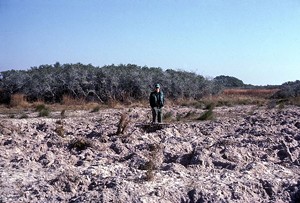Published March 24, 2010 at 9:24 a.m.
Ah, Vermont, where one is rarely far from nature and its wildlife: the hermit thrush and the brook trout, the moose and the mink, the wild pig and the white-tailed deer, the…
Wait a minute.
Wild pig? As in boars?
Yup, they’re here. Not many of them, not everywhere, and not a breeding population. Not yet.
But Vermont is now one of 44 states in which at least a few feral pigs live, according to the generally recognized authority on the subject, John J. Mayer Jr. A research scientist and manager at the Savannah River National Laboratory in Aiken, S.C., he says the nation could be on the verge of a “pig bomb” as the voracious animals expand their range. Boars have a habit of churning up farms and gardens and devouring every lamb, calf or kitten they can find.
According to Mayer, wild pigs will eat almost anything, animal or vegetable. They don’t actually eat mineral, but so voracious are they that, when thirsty, they’ll dig up a yard to get to its underground sprinkler system and chew right through the PVC pipe.
Wild pigs also damage trout fisheries. By rooting, eating and excreting along riverbanks, they pollute the water, and by removing vegetation, they cause erosion that covers trout redds (spawning areas) with silt.
But don’t panic, at least not yet. First of all, Vermont’s feral pigs are probably not full-fledged boars (Sus scrofa) but some combination of boar and regular old pig (Sus domestica), visible on the farm and edible on the plate.
Furthermore, wild pigs do not routinely attack humans. Unless the human is walking his or her dog. Wild pigs do routinely attack dogs.
Boars are not native to Vermont. Whence do they come? New Hampshire. The animals are not native to that state, either, but they were imported from Germany more than 100 years ago to be hunted in Corbin Park. Austin Corbin, founder of the Long Island Rail Road, created the roughly 20,000-acre fenced impoundment in 1886.
The fence is supposedly boar proof. It is not, however, people proof, and in and around Cornish and Croydon, about eight miles east of Windsor County, Vt., some of the locals — perhaps unhappy about being excluded from all that land while millionaires paid thousands for exotic hunts — cut holes in the fence. Some are so big, Mayer says, “You could drive a truck through.”
It is through those gaps, he notes, that several wild hogs have escaped and swum across the Connecticut, probably making landfall somewhere between Windsor and Hartland.
Boars reside in a similar, if smaller, impoundment in Vermont, Wild Hill Preserve in Fairlee, where either the fences are stronger or the neighbors are calmer, and there have been no reports of porcine getaways.
Right now, Mayer estimates, there are fewer than 100 feral pigs in Vermont, and the weather may prevent them from ever establishing themselves here. “Piglets may not be able to survive a cold winter,” he suggests.
But this past winter was mild, and there are established boar populations in Michigan and four western Canadian provinces, which are as cold as if not colder than Vermont. What can be done if a breeding population does establish itself? Basically, nothing, Mayer says. Extirpation is all but impossible.
Besides, it’s likely that hunters, a potent lobby in Montpelier, would fight extirpation efforts. They want enough boars to survive to be hunted. Among other consequences, then, a wild boar population could create a long-term political squabble pitting gardeners, anglers, farmers, hikers and environmentalists against hunters.
Political boars. Now, there’s a concept.
Speaking of Animals
-

Q&A: A Clinic Has Cared for Old North End Pets for Almost 20 Years
Jan 31, 2024 -

Video: The Old North End Veterinary Clinic Has Kept Costs Low to Help Pets in Burlington for Almost 20 Years
Jan 25, 2024 -

Q&A: Merrymac Farm Sanctuary in Charlotte Provides a Forever Home for Neglected Animals
Dec 6, 2023 -

Video: Neglected Animals Find a Home With Era MacDonald at Merrymac Farm Sanctuary in Charlotte
Nov 30, 2023 -

Response Teams Provide Shelter for Pets of Evacuated Vermonters
Jul 16, 2023 - More »
Comments
Comments are closed.
From 2014-2020, Seven Days allowed readers to comment on all stories posted on our website. While we've appreciated the suggestions and insights, right now Seven Days is prioritizing our core mission — producing high-quality, responsible local journalism — over moderating online debates between readers.
To criticize, correct or praise our reporting, please send us a letter to the editor or send us a tip. We’ll check it out and report the results.
Online comments may return when we have better tech tools for managing them. Thanks for reading.











































